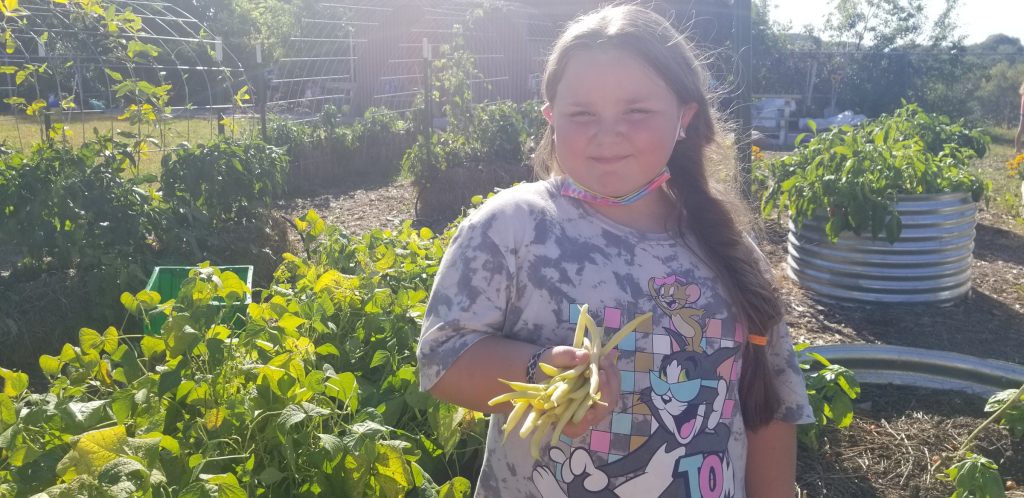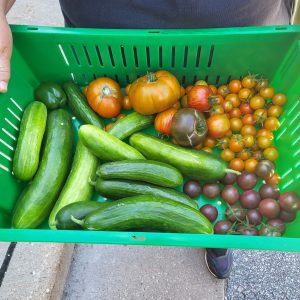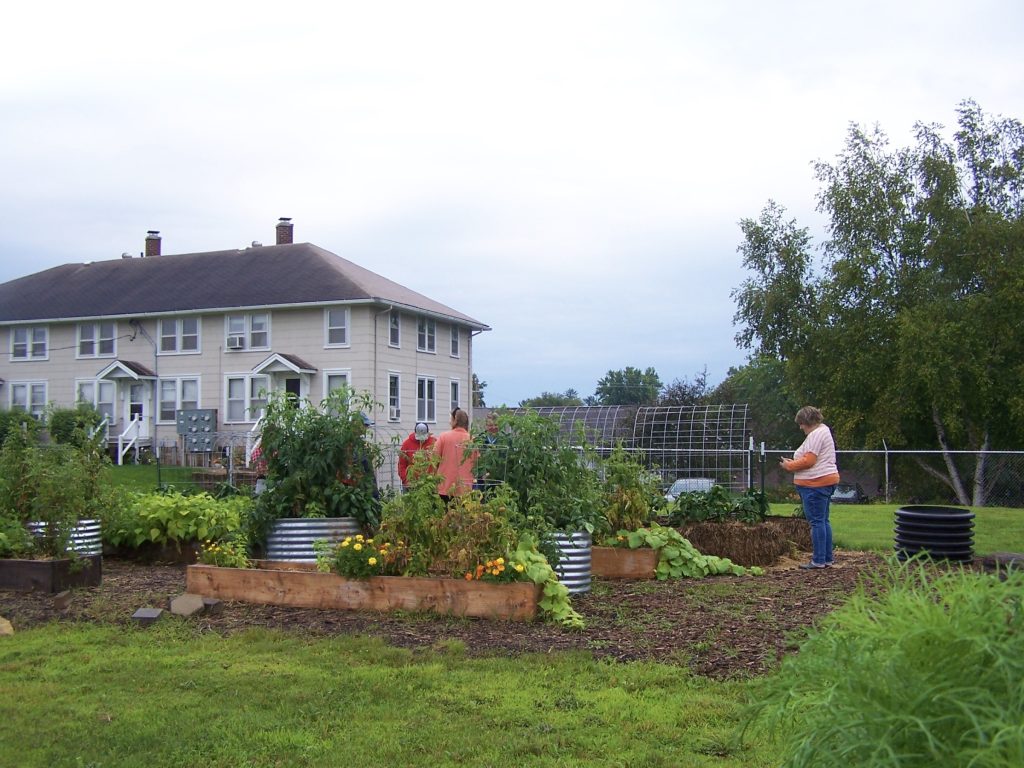The SNAP-Ed funded program FoodWIse partners with McIntosh Library, Master Gardeners and Community Hunger Solutions in Viroqua, Wisconsin to develop a community education garden with Growing Together WI grants. Since first awarded funding in 2021, the garden partners continue connecting local fresh produce with neighbors who experience barriers to access these foods, creating educational opportunities for young residents, and focusing community conversations around food security and access.
Situation
In downtown Viroqua, the largest town in Wisconsin’s rural Vernon County, the 2022 Wisconsin Library of the Year is a unique networking space. Director of Youth Services at McIntosh, Laci Sheldon calls it a “library without walls,” where residents “capitalize on community strengths.” On Saturday mornings from May to October, this can mean shopping with vendors of the Viroqua Farmers Market, who sell their produce just outside the front doors of the library.
On the opposite side of the building sits a historic outdoor pool, one where both FoodWIse Coordinator Sheena Cook-Fuglsang and Laci swam as children. Filled in and covered years ago, the pool is in visual disrepair. Laci shares that it also is a “sore spot because of disagreements in the community.” When Sheena approached Laci with the opportunity to apply for a Growing Together WI grant through UW Madison-Division of Extension’s SNAP-funded nutrition education program FoodWIse, they considered the publicly-owned pool site a location where they could support garden-based educational programming. In an area where the poverty rate was 17%, the donation garden could also increase access to fresh produce.
Approach
Sheena and Laci applied for a Growing Together WI grant in 2021. This funding, renewable up to 4 years, aims to improve healthy food availability and access for community members through garden-based nutrition education. Collaboration with Master Gardeners is a key component as these volunteers’ expertise to establish and maintain food gardens supports participants’ learning throughout the seasons. With guidance from FoodWIse Policy, Systems & Environmental Change Specialist Sarah Smith, Sheena and Laci accessed resources that offered blueprints for developing the garden space and completing applications for the funding in 2022 and 2023.
Their vision for a garden on the historic and untended plot meant connecting with city government for approval to use the site. Without plumbing or running water, they connected with the county Public Works Department to better understand opportunities to keep plants well-watered throughout a growing season. Coordination from the local level wove with state and federal governments as the Wisconsin FoodWIse program brought nutrition education programs and SNAP-Ed funded the efforts. With flexible and nimble work, the partners that Laci and Sheena engaged helped highlight an important focus on community access and wellness.
Outcomes & Continued Opportunities


With $2,500 in 2021 funding, Laci and Sheena designed the garden focused on accessibility and variety. This included two ADA-compliant beds, straw bales and ground beds to show some different ways vegetables grow. Celebrated with a ribbon-cutting event, the garden welcomed birth to 3 year-old learners and 1st to 4th graders to hear books focused on a produce item they could then pull from the soil or vines, wash clean and taste fresh. Master Gardeners offered support to teach the basics of growing plants, as well as expertise to care for the fruitful plants.
The space included special events as well. During National Farmers Market Week in August of 2021, Wisconsin State Senator for 32nd District Brad Pfaff and Wisconsin Assembly Representative Loren Oldenburg visited the garden. Laci also invited the traveling opera Mixed Precipitation to perform The Magic Flute. These events and visits show how the arts and government can be part of the garden’s work, alongside literacy and nutrition.
Funding in 2022 helped Laci and Sheena continue expanding the established partnership with partner Community Hunger Solutions. Each year, CHS receives, weighs and delivers garden produce to the low-income Park View apartments and senior dining spaces. This connection continues to build trust with residents. Recognizing that “not everyone has decision-making of spaces and places,” Laci and Sheena seek Park View input on the produce residents want to learn about and eat in the 2023 season.
As Laci says, “you feel connected to food when you see the garden.” What was once an abandoned though historic site has become a focal point in Viroqua, where conversations around food security, access and wellness are tended with committed care as the garden finds its sustainable roots.
Find your local FoodWIse Coordinator in our directory and reach out to learn more about Growing Together WI and garden-based education opportunities!





